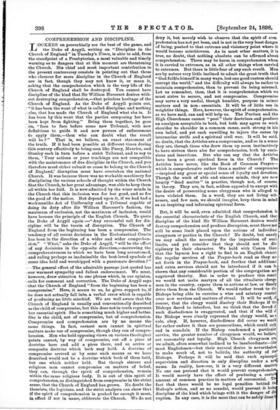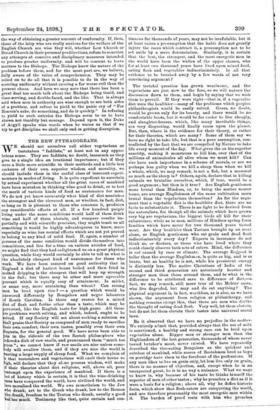COMPREHENSION AND DISCIPLINE. T OOKERS on proverbially see the best of
the game, and 4
the Duke of Argyll, writing on "Discipline in the Church of England" in Tuesday's Times, is able to add, from the standpoint of a Presbyterian, a most valuable and timely warning as to dangers that at this moment are threatening the Church. His chief and most important contribution to the present controversy consists in pointing out that those who clamour for more discipline in the Church of England are in fact, though they may not know it, or mean it, asking that the comprehension which is the very life of the Church of England shall be destroyed. You cannot have discipline of the kind that Sir William Harcourt desires with- out destroying comprehension,—that priceless heritage of the -Church of England. As the Duke of Argyll points out, .." it has been the want of what is called discipline, and nothing • else, that has made the Church of England what she is. It has been by this want that the parties composing her have been kept from fighting." Bring them together, he goes on, "face to face before some new Tribunal, with new definitions to guide it and new powers of enforcement to apply them,—then who can doubt what the result will be ? " That is, we believe, an exact statement of the truth. If it had been possible at different times during this century effectively to bring men like Posey, Maurice, and Stanley each in turn before a strict Tribunal, and to say to them, ' Your actions or your teachings are not compatible with the maintenance of due discipline in the Church, and you therefore must either submit or cease to belong to the Church of England,' disruption must have overtaken the national Church. It was because there was no workable machinery for disciplining the various schools of thought within the Church that the Church, to her great advantage, was able to keep them all within her fold. It is now admitted by the wiser minds in the Church that this inclusion was for her good, and so for the good of the nation. But depend upon it, if we had bad a workmanlike Act of Uniformity and a Tribunal capable of doing its duty after Sir William Harcourt's fashion, the maximum of exclusion, not the maximum of inclusion, would have become the principle of the English Church. To quote the Duke of Argyll again :—" Any successful call for dis- cipline will be the tocsin of disruption. The Church of England from the beginning has been a compromise. The tendency of all recent decisions in the Ecclesiastical Courts has been in the direction of a wider and wider comprehen- sion." "What," asks the Duke of Argyll, "will be the effect of any decisions in the opposite direction,—narrowing the • comprehensiveness to which we have been long accustomed, and ruling perhaps as inadmissible the best-loved symbols of some idea held and worshipped with a passionate devotion ? "
The general effect of the admirable passage just quoted has - our warmest sympathy and fullest endorsement. We must, however, draw attention to one phrase which, in our opinion, -calls for comment and correction. The Duke of Argyll says that the Church of England "from the beginning has been a compromise." Here, it seems to us, he gives support to, if he does not actually fall into, a verbal error which is capable of producing no little mischief. We are well aware that the Church of England is usually and conventionally described as the child of compromise, but this does not in truth represent her essential spirit. She is something much higher and better. She is the child, not of compromise, but of comprehension. Compromise and comprehension are by no means the same things. In fact, earnest men cannot in spiritual matters make use of compromise, though they can of compre- hension. Men who hold opposing views on various theological points cannot, by way of compromise, cut off a piece of doctrine here and add a piece there, and so arrive at composite doctrine which both may hold. A doctrine of compromise arrived at by some such means as we have -described would not be a doctrine which both of them held, but one which neither held. But though sincere and religious men cannot compromise on matters of belief, they can, through the spirit of comprehension, remain within the same religious body. It is out of this spirit of comprehension, as distinguished from compromise in the strict sense, that the Church of England has grown. No doubt the theorists, the logicians, and the strict analysts can show that if the spirit of comprehension is pushed far enough it must, in effect if not in name, obliterate the Church. We do not deny it, but merely wish to observe that the spirit of corn prehension has not yet been, and is not in the very least danger of being, pushed to that extreme and visionary point where it would become mischievous. As in most other matters, it is true, no doubt, that nothing absolute can be affirmed about comprehension. There may be harm in comprehension when it is carried to extremes, as in all other things when carried to extremes. But there is little fear of any such result. Men are by nature very little inclined to admit the great truth that "God fulfils himself in many ways, lest one good custom should corrupt the world," and the difficulty will always be rather to maintain comprehension, than to prevent its being misused. Let us remember, then, that it is comprehension which we must strive to secure, and not compromise. Compromise may serve a very useful, though humbler, purpose in minor matters and in non. essentials. It will be of little use in weightier things. Here, however, the spirit of comprehension, as we have said, can and will help us. The Puritan and the High Churchman cannot "pool" their doctrines and produce an amalgam acceptable to both, but both may agree to work shoulder to shoulder in a common cause, each strong in his own belief, and yet each unwilling to injure the cause by internecine strife and a spiritual civil war. It will be said, no doubt, that the Articles are a compromise, and so in a sense they are, though those who drew them up seem instinctively to have striven there also for comprehension, both by omis- sions and insertions. But who can say that the Articles have been a great spiritual force in the Church The Articles have never, like the Book of Common Prayer— which is comprehensive rather than a matter of compromise —inspired any great or special sense of loyalty and devotion. Though the work of able and sincere minds, they are now largely "dead matter" in practice, though not, of course, in theory. They are, in fact, seldom appealed to except with the desire of persecuting some clergyman who is alleged tc have violated them. In a word, they are not living wit- nesses, and few men, we should imagine, keep them in mind as an inspiring and informing spiritual force.
But, it will be said, even admitted that comprehension is the essential characteristic of the English Church, and that discipline of the kind Sir William Harcourt desires would destroy comprehension and produce disruption, must there not still be some limit placed upon the actions of individual clergymen or parties in the Church ? No doubt, but surely we may admit the necessity for the imposition of such limits, and yet consider that they should not be dis• ciplinary in their character. We hold with Canon Gore that the layman has a right to find in an English church the regular services of the Prayer-book read as they an set forth in the Prayer-book, and further that additional and extra services should not be introduced if it can be ahovrn that any considerable portion of the congregation are aggrieved thereby. But in order to produce this result we would not make martyrs of all the ritualistic clergy- men in the country, expose them to actions at law, or finally drive them from the Church. We would rather trust to the Bishops being able to exercise a wise and salutary control over new services and matters of ritual. It will be said, of course, that the clergy would disobey their Bishops if the Bishops dared to interfere, but we think that the dread of such disobedience is exaggerated, and that if the will of the Bishops were clearly expressed the clergy would, as a rule, obey. If, however, disobedience did occur we would far rather endure it than see prosecutions, which could only' end in scandals. If the Bishop condemned a particular service, the greater number of clergymen would, we beliere, act reasonably and loyally. High Church clergymen are, we admit, often somewhat inclined to be insubordinate—like most Englishmen—but their natural desire is nevertheless to make much of, not to belittle, the authority of the Bishops. Perhaps it will be said that such episcop supervision and direction is only discipline under a ne name. In reality, however, it is a very different matter No one can pretend that it would prevent comprehensio It would merely have the effect of producing a. certa amount of common practice in matters of ceremonial. Th fact that there would be no legal penalties behind th Bishop's action, and so no scandal, would prevent it bein discipline of the kind which brings with it the danger of a ruption. In any case, it is the most that can be safely done the way of obtaining a greater amount of conformity. If, then, those of the laity who are really anxious for the welfare of the English Church are wise they will, whether Low Church or Broad Church in their personal predilections, refuse to sanction any attempts at coercive and disciplinary measures intended to produce greater uniformity. and will be content to leave matters to the Bishops. The Bishops know the nature of the problem before them, and for the most part are, we believe, fully aware of the value of comprehension. They may be relied on to do all that it is possible to do in the way of securing uniformity without causing a far worse evil than the present chaos. And here we may note that there has been a great deal too much talk about the Bishops being timid, and time-serving, and double-faced, and the like. That is always said when men in authority are wise enough to see both sides of a problem, and refuse to yield to the panic cry of "For Heaven's sake, do something, and do it quickly." In refusing to yield to such outcries the Bishops seem to us to have shown not timidity but courage. Depend upon it, the Duke of Argyll speaks wise words when he warns us that if we try to get discipline we shall only end in getting disruption.







































 Previous page
Previous page